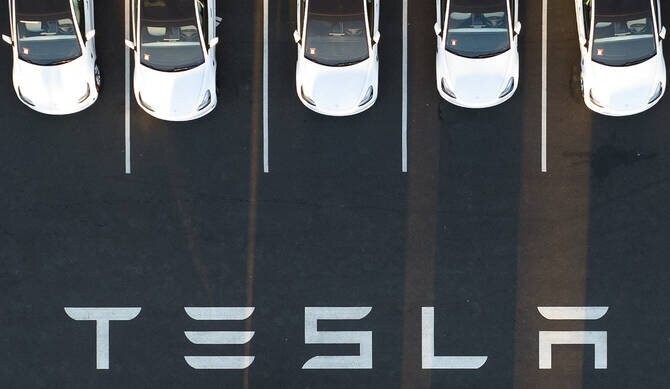
Tesla Profit Plunges as Musk's Political Activities Continue to Deter Buyers
The electric vehicle and battery company sees revenue drop 12 percent and profits slump 16 percent in the latest quarter.
The impact of Elon Musk's foray into politics on his Tesla business continues to be significant, with both sales and profits declining sharply for the third consecutive quarter.
In the three months through June, revenue decreased by 12 percent, and profits dropped by 16 percent compared to the same period last year.
This decline is attributed to the perception that Musk's political activities have tarnished the brand, making it less appealing to potential buyers.
Forrester analyst Dipanjan Chatterjee noted that Tesla has become a 'toxic brand' inseparable from its leader, which explains the ongoing slump in sales and profits.
Quarterly profits fell to $1.17 billion, or 33 cents per share, down from $1.4 billion, or 40 cents per share.
The company slightly exceeded Wall Street's revenue forecast of $22.5 billion, generating $22.5 billion in the April through June period.
Tesla shares remained unchanged after hours as investors awaited further details during the earnings call scheduled for later in the day.
Musk has been focusing on developing robotaxis, automated driving software, and robotics to drive the company's future growth.
However, these businesses have yet to gain traction, leading to a noticeable gap between promise and profits.
One significant challenge facing Tesla is that potential buyers, not only in the US but also in Europe, continue to be deterred by Musk's political stance.
His support for far-right candidates in several European countries has alienated many customers, providing an opportunity for rival electric vehicle manufacturers like BYD and Volkswagen to gain market share.
Despite these challenges, Tesla is moving forward with its plans to launch a paid robotaxi service in Austin, Texas, and intends to introduce the service in other cities soon.
Musk aims to have hundreds of thousands of driverless taxis on US roads by the end of next year.
However, Tesla faces intense competition from established players like Waymo, which has been operating in multiple cities and recently completed its ten-millionth paid trip.
In addition to the challenges posed by political controversy and competition, Tesla also faces changes in government policies that could negatively impact its business.
The recent federal budget passed by Congress eliminates tax credits for electric car purchases, which had been worth up to $7,500.
This change threatens Tesla's revenue generated from selling carbon credits to traditional car manufacturers.
In an effort to boost sales, Tesla plans to introduce a cheaper model in the last three months of the year, shifting management's focus away from delivery growth towards robotaxis and autonomy.
Musk remains optimistic about the company's future, stating that if it executes well with vehicle and humanoid robot autonomy, it could become the most valuable company in the world.
Overall, Tesla's latest quarterly performance highlights the ongoing challenges associated with Elon Musk's political activities, increased competition, and evolving government policies.
These factors will likely continue to impact the company's ability to grow its sales and profits in the near future.
In the three months through June, revenue decreased by 12 percent, and profits dropped by 16 percent compared to the same period last year.
This decline is attributed to the perception that Musk's political activities have tarnished the brand, making it less appealing to potential buyers.
Forrester analyst Dipanjan Chatterjee noted that Tesla has become a 'toxic brand' inseparable from its leader, which explains the ongoing slump in sales and profits.
Quarterly profits fell to $1.17 billion, or 33 cents per share, down from $1.4 billion, or 40 cents per share.
The company slightly exceeded Wall Street's revenue forecast of $22.5 billion, generating $22.5 billion in the April through June period.
Tesla shares remained unchanged after hours as investors awaited further details during the earnings call scheduled for later in the day.
Musk has been focusing on developing robotaxis, automated driving software, and robotics to drive the company's future growth.
However, these businesses have yet to gain traction, leading to a noticeable gap between promise and profits.
One significant challenge facing Tesla is that potential buyers, not only in the US but also in Europe, continue to be deterred by Musk's political stance.
His support for far-right candidates in several European countries has alienated many customers, providing an opportunity for rival electric vehicle manufacturers like BYD and Volkswagen to gain market share.
Despite these challenges, Tesla is moving forward with its plans to launch a paid robotaxi service in Austin, Texas, and intends to introduce the service in other cities soon.
Musk aims to have hundreds of thousands of driverless taxis on US roads by the end of next year.
However, Tesla faces intense competition from established players like Waymo, which has been operating in multiple cities and recently completed its ten-millionth paid trip.
In addition to the challenges posed by political controversy and competition, Tesla also faces changes in government policies that could negatively impact its business.
The recent federal budget passed by Congress eliminates tax credits for electric car purchases, which had been worth up to $7,500.
This change threatens Tesla's revenue generated from selling carbon credits to traditional car manufacturers.
In an effort to boost sales, Tesla plans to introduce a cheaper model in the last three months of the year, shifting management's focus away from delivery growth towards robotaxis and autonomy.
Musk remains optimistic about the company's future, stating that if it executes well with vehicle and humanoid robot autonomy, it could become the most valuable company in the world.
Overall, Tesla's latest quarterly performance highlights the ongoing challenges associated with Elon Musk's political activities, increased competition, and evolving government policies.
These factors will likely continue to impact the company's ability to grow its sales and profits in the near future.